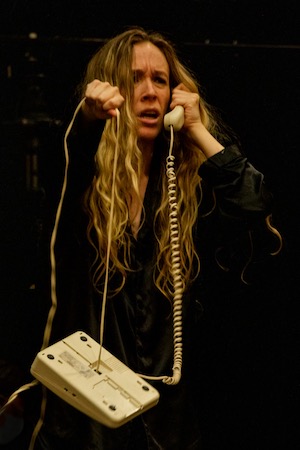By Marina Catullo
Though it can be hard to imagine now, opera once occupied a prominent spot in popular culture. While performed opera was a luxury reserved for the upper classes of society in 19th century Europe, the operatic hits were well-known by rich and poor alike. Today, however, opera has garnered a reputation of elitism. Ticket prices and language barriers are both culprits, but perhaps even more at fault is the belief that opera is reserved for only a niche group of people.
Soprano Ashley Galvani Bell is working to dispel this belief through her opera company Divaria Productions, which aims to make quality opera more accessible by blending it with other mediums, such as theatre and film. Bell grew up surrounded by a love for theatre and film. Her mother was an actress, and Bell herself began performing as a member of the Metropolitan Opera Children’s Chorus at just nine years old. At 16, one of Bell’s teachers, an opera conductor, encouraged her to give opera a shot. He took her to a festival in Italy, which sparked her lifelong love of both opera and the Italian language.
While many performers choose to go to a conservatory to study music after high school, Bell was adamant that she wanted to pursue her liberal arts education. It was only after graduating Phi Beta Kappa from Yale University with distinction in Italian and international studies that Bell pursued her operatic career. She has since performed in Hadyn’s Nelson Mass and Schubert’s Mass in C as the soprano soloist at Carnegie Hall, as well as many other soloist roles in the United States, Italy, Spain, France, and Russia.
Before the pandemic hit, Divaria Productions intended to stage a production of Gaetano Donizetti’s Maria Stuarda, an opera about Mary, Queen of Scots, combined with Friedrich Schiller’s Maria Stuart, the play that formed the basis for Donizetti’s opera. After theaters stopped allowing live shows, Bell had to pivot or risk losing her donor money. She and colleague Antón Armendariz decided to make a film. To do this within the parameters of Covid-19 safety protocols, they chose to make it a documentary-style film drawing on primary source letters between Mary, Queen of Scots and Queen Elizabeth I, who never actually met in person, rather than filming a stage production of the opera. The story told by the letters is instead interwoven with music from the opera to emphasize the emotions the two queens might have been feeling.
The operatic documentary, Rival Queens, was filmed with individuals in four different locations. Bell called the unique filming experience “very challenging” but also “an adventure.” As well as playing one of the documentary’s titular characters, Mary, Queen of Scots, Bell wrote the documentary’s narrative screenplay. The documentary has been recognized by 29 international film festivals and won 17 awards.

Also during the pandemic, Bell worked with Richard F. Mollica, a professor of psychiatry at Harvard Medical School and the director of the Harvard Program in Refugee Trauma at Massachusetts General Hospital. Bell was tasked with creating a class about opera through the lens of refugees and human rights. “It was very meaningful for me to understand the power that music can have for humans in self-healing,” Bell said.
Further exploring this healing power of music is another goal of Divaria Productions. At the time of the company’s founding in 2011, Bell’s grandmother was suffering from dementia. Bell would visit her at 80th Street Residence, an assisted living facility specializing in memory loss, dementia, and Alzheimer, and perform concerts. It just so happened that a man who used to be a pianist at Columbia University was also at the residence. After her piano performances, Bell would ask him if he enjoyed the music, and he would tell her yes. This may seem like a small thing on paper, but the man had lost most of his ability to communicate verbally by this point in time. Bell said that it was powerful to see how sometimes the “music would bring them back.” Inspired by her experience with the pianist as well as her grandmother’s own dementia, Bell has made outreach to groups of patients with Alzheimer’s and other ailments one of the pillars of her company.
Bell is currently in Spain working with the Bilbao Opera on a double bill, Francis Poulenc’s La Voix Humaine and Alexander Zemlinsky’s Eine Florentische Tragödie. Bell has performed La Voix Humaine four separate times, starting in 2018, and describes the role as one of the “most interesting” that she’s done. The piece stars just one character, a woman on the phone having her last conversation with her lover. She moves through a multitude of emotions, from anger to jealousy to sensuality, and despair. Bell said that the director she is working with has called the role an “encapsulation of the life of a woman in 45 minutes.”

However, if it weren’t for her company putting on a production of Poulenc previously, Bell isn’t sure she would have been offered her current role with the Bilbao Opera. “As a young opera singer, it’s really tough to break in because the companies expect you to have certain roles on your resume already. If they want to hire you for Mimi in La Bohème, they want to hire someone that’s already done it. But if you haven’t, if no one gives you the chance to do it, how are you going to get that on your resume?” Bell asked.
Bell’s advice for newly inducted Phi Beta Kappas is to create your own opportunities when necessary. “If it’s not happening for you in the traditional way, don’t be afraid to try to make your own path,” she said.
Marina Catullo is a graduate of the University of South Carolina where she studied political science and English. She was inducted into Phi Beta Kappa there in April 2021. The University of South Carolina is home to the Alpha of South Carolina chapter of Phi Beta Kappa.




